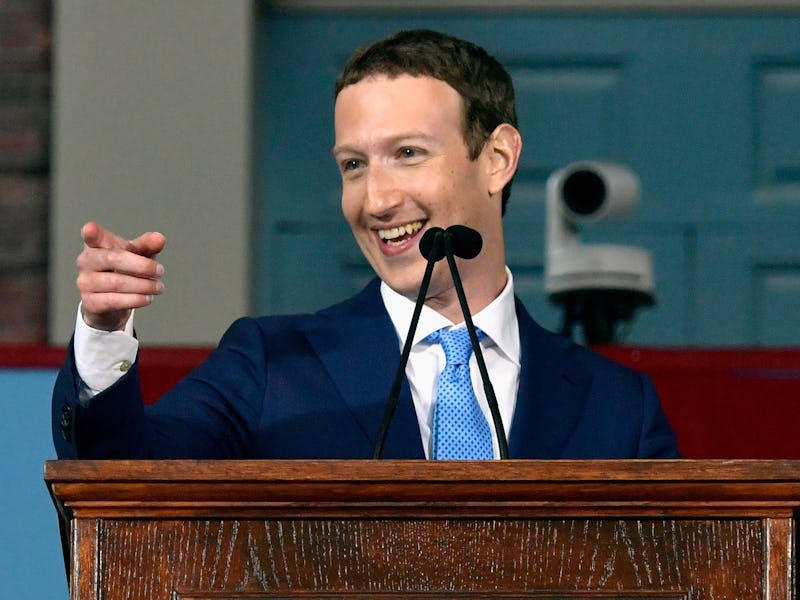Why Mark Zuckerberg Shouldn't Run for President
Celebrity egos and billionaires are killing representative government.

Good news for people who hate money and want to live in an oligarchy: There’s a Super PAC that’s taking donations to encourage Facebook CEO Mark Zuckerberg to run for President of the United States.
Zuckerberg has been on an extended road tour across the country, meeting the kind of regular Americans you just don’t find in a Bay Area that the tech industry has quickly rendered outrageously expensive and gentrified. He’s said he’s not running for public office in 2020, but he’s certainly acted like someone working to lay the groundwork for a campaign, talking up big policy proposals and speaking in Rooseveltian terms about the “struggle of our time” against the “forces of oppression.”
Zuckerberg’s tour and pronouncements have been followed with intense interest, and his prospects have been taken seriously. While no outlet is endorsing him, there is a sense that he could be a savior; a madman billionaire has just stormed the White House, so maybe an excruciatingly rational billionaire could save us.
That line of thought, though, is at the core of what’s wrong with American democracy.
Even before Donald Trump was elected, the Supreme Court’s decision in the Citizens United case unleashed a torrent of money into a political system that was not short on dirty cash already. The Koch brothers have built an empire devoted to funding candidates up and down the ballot who will enact their far-right agenda; billionaire magnates like Sheldon Adelson also pour money into helping candidates who support their causes.
The most promising candidates now often raise enough money to opt out of public matching funds offered by states meant to even the playing field but keep campaign spending down. The next governor of New Jersey will likely be a former ambassador to Germany named Phil Murphy, a former Goldman Sachs exec who fundraised his way to the position in Berlin and then spent enough of his own money to buy inevitability in the Democratic primary.
We’ve had rich politicians since the dawn of our democracy, but Trump’s emergence has expanded the stunning gap between public officials and the people they govern in a way the founding fathers could not have envisioned; after all, they were fighting for freedom from a king. And that doesn’t just go for the financial gap, either; as the recent semi-serious speculation about Dwayne “The Rock” Johnson’s potential political ambitions show, fame is now becoming a pre-requisite for national office.
It started mainly as an internet joke that the savvy actor and wrestler embraced on social media. Then, during a press tour for his new Baywatch movie (a bomb that may have disqualified him for public office in more genteel eras), he started talking more seriously about what he now called “a real possibility.”
“I’d like to see a better leadership,” he told GQ, beginning the most vague statement of principles possible. “I’d like to see a greater leadership. When there’s a disagreement, and you have a large group of people that you’re in a disagreement with — for example, the media — I feel like it informs me that I could be better.”
A few weeks later, on SNL, he joked that with Trump in office, he was now overqualified to be president, which was funny but also scary because it seemed true. Then he “announced” a campaign with Tom Hanks as his running mate. Sure, that was fiction, but these months of ridiculous speculation lent support to the twin notions that the government is a joke, and reserved only for the rich and famous.
Despite record spending and media coverage, only 58 percent of eligible Americans voted in the 2016 election, in large part because people felt disconnected from the candidates. Only 48 percent of people thought that Hillary Clinton understood their needs, while just 36 percent thought the same of Trump.
The Rock on the campaign trail (for 'Jumanji')
As we slide further down this gilded slope, the more government will seem like an out-of-reach entity, a Big Brother-type organization run for and by an oligarchy of rich (mostly) white men. Even worse, fewer and fewer people will see work in government as a viable career path, and the notion of running for public office — already preposterously expensive and elite — will seem absolutely impossible.
It can be fun to play political fantasy sports with celebrities, imagining what their administrations and policies might look like. But something far more pernicious and dangerous exists beyond jokes about “Can You Smell What The Rock Is Cooking?” campaign posters or Zuckerberg “friending” voters. Cheering their potential runs for office is not just making America even more of a chaotic reality show, it’s embracing a red carpet coup that could make government representational in name only.